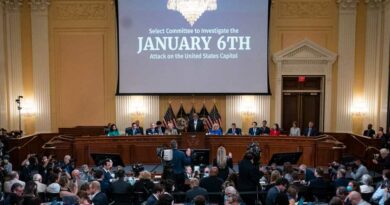The assault on Seattle’s police
Seattle police face staffing crisis
An anti-police climate prompted more than 200 of the city’s law enforcement officers to quit last year. Reaction from Seattle Fraternal Order of Police President Marco Monteblanco.
Across urban America, the evidence is piling up that when you demonize police and cut their budget, you get more crime. The latest example is Seattle, where slashing the police budget has imperiled reform and endangered poor and minority communities.
Federal Judge James Robart oversees a longstanding police-reform consent decree between the Department of Justice and the city of Seattle. Last week his court released video footage of a hearing this month in which monitor Antonio Oftelie lists Seattle’s political impediments to protecting public safety.
The City Council cut the 2021 police budget by nearly $35.6 million, or about 9%, compared to 2019. Councilor Kshama Sawant claimed "the role of the police under capitalism" is "to defend the system’s deep inequality through ongoing repression of the poor, the marginalized, and communities of color." Other councilors signed a pledge to address "the ongoing assault on Black lives perpetuated by a well-funded police state that acts with near impunity."
In Mr. Oftelie’s new semi-annual report, Police Chief Adrian Diaz describes how "amidst often hostile rhetoric," the department "experienced an unprecedented exodus of officers to other jurisdictions." Since Jan. 1, 2020, some 287 Seattle cops have retired or resigned.
SEATTLE POLICE DEPARTMENT LOSING OFFICERS AT 'RECORD PACE' AMID BUDGET UNCERTAINTY, LACK OF SUPPORT: OFFICIALS
Police spokesman Randall Huserik says the department has pleaded with the City Council for money to attract new applicants. The department has also sought permission to reallocate money that would have paid the departed officers’ salaries. The City Council has approved neither request, and police have hired only 87 new officers in two years.
"Emergency calls are now at or above pre-pandemic levels as the world re-opens," Mr. Oftelie testified, but "this demand for services is occurring during a staggering loss of a number of officers in a short period." He said "response times are increasing, while reduced resources confront this increase in emergency calls," including high levels of gun violence and homicide.
From January through July 2021, police responded to 310 shootings, compared to 223 over the same period in 2020 and 197 in 2019. So far this year Seattle has had 26 homicides, compared to 37 in all of 2019. Police have had to pull officers from investigations and special operations to patrol.
The City Council’s budget cuts have also undermined progressive goals. Mr. Oftelie observed that "much of the training, technology and review systems implemented under the consent decree cannot be sustained without necessary budget and personnel." He described how "essentially there is no community policing happening in Seattle" because of the cuts and staff shortages.
CLICK HERE TO GET THE FOX NEWS APP
Mr. Oftelie concluded that "the actions and investments of the city will either tip the department into a deepening crisis or lead the department into a future in which it can sustain compliance and build trust in constitutional policing."
There’s only so much a federal monitor and judge can do if Seattle’s political leaders won’t help. "The city and the mayor and other elected officials and the City Council need to be constructive, not destructive to progress," Judge Robart said. "I have seen too much of knee-jerk reaction and not enough forethought. We have to be diligent in continuing to reduce bias and disparities. At the same time, we need to recognize public safety is imperative for all residents and communities."
November’s elections will decide who is mayor and city attorney and who fills two City Council seats. Residents who vote for the status quo will get the growing disorder they deserve.
Source: Read Full Article


